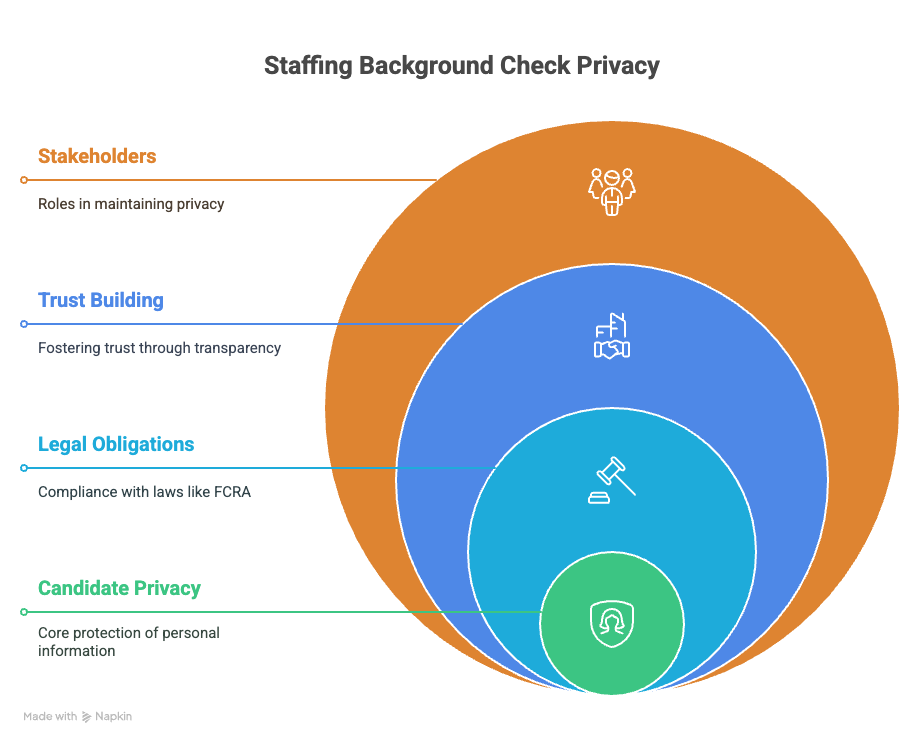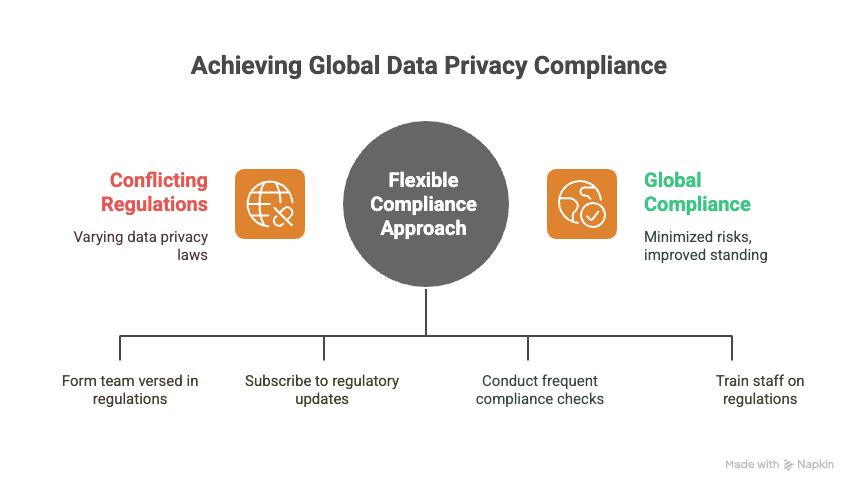In today's rapidly evolving digital landscape, navigating data privacy regulations in staffing and employment screening processes is more critical than ever. With global privacy concerns at the forefront, both employers and employees need to understand the intricacies of "staffing background check privacy." This comprehensive guide will explore the intersection of data privacy regulations and staffing screening, providing insights into employment screening compliance, the implications of GDPR on background checks, and the broader landscape of staffing.
Key Takeaways
- Data privacy in recruitment is now a primary concern, reflecting a significant shift from its earlier role as a mere compliance requirement.
- Effective staffing background checks require safeguarding candidate data while complying with laws such as the Fair Credit Reporting Act.
- GDPR has introduced strict regulations affecting how candidate data is managed globally, necessitating explicit consent and careful processing.
- Global privacy regulations vary widely, demanding a flexible approach and proactive measures to avoid penalties and protect reputation.
- The integration of technology in staffing can improve efficiency, but it's crucial to implement solid data security practices to maintain trust.
Introduction
Data privacy has surged to the forefront of recruitment concerns. As someone steeped in twenty years of background checks in the United States, I've seen the landscape shift. There was a time when data privacy was secondary—a checkmark on a compliance list. That era is gone.
The guide you're about to explore aims to untangle these complexities. It demystifies the regulations that govern how we handle candidate data during staffing and employment screening. The objective? Ensuring that your screening practices align not just with the law, but also with the trust candidates place in you.
This guide will dissect the pressing elements of privacy within staffing background checks. We'll provide you with strategies to keep your processes compliant while maintaining integrity. Are you prepared to navigate these waters and enhance your organization's reputation through trustworthy practices? Let's start.
EXPERT INSIGHT: Navigating data privacy in staffing isn’t just about compliance—it’s about earning trust in every step of the hiring journey. Today, resume papers are electronic, and computers process most work, so job seekers provide us with their personal data. We then owe them a great responsibility. We are required to be legally correct and to develop systems and an atmosphere where candidate data remains safe and transparent. The better we protect data, the greater trust we establish, and this allows us to attract better people. - Charm Paz, CHRP
Understanding Staffing Background Check Privacy
Staffing background check privacy is about protecting the personal information of candidates when conducting employment screenings. This involves safeguarding sensitive data—from work history to criminal records—during the hiring process. The goal is to balance the employer's need to verify credentials with the candidate's right to privacy. As the digital world grows, so do privacy concerns, making this balance more crucial.

Why is candidate privacy important? For one, it builds trust. You wouldn't want your personal details exposed without consent, and neither do candidates. Legal obligations also come into play. U.S. laws such as the Fair Credit Reporting Act (FCRA) require consent for sharing information and outline how that information can be used. Without adherence to these standards, companies can face legal trouble and damage to their reputation.
The stakeholders in this process are varied and each plays a unique role. Employers need to know they are making informed hiring decisions. Staffing agencies strive to meet client needs while respecting candidate rights. Candidates deserve transparency about what is checked and how their data is handled. Legal entities ensure that all parties follow privacy laws.
As someone with two decades in the field, I've seen the pitfalls when privacy is ignored. One company skipped consent, believing background checks were routine. They faced backlash and a lawsuit from a rejected candidate. It was costly, both financially and for their brand image. This example serves as a reminder: protect privacy, because it’s not just a legal box to check—it's a matter of trust and respect. How do you ensure your processes are both thorough and respectful of privacy?
Employment Screening Compliance
Compliance in employment screening begins with understanding the essential requirements. At its core, it’s about ensuring that your background check processes adhere to the legal standards set by the authorities. The Fair Credit Reporting Act (FCRA) plays a crucial role in this. It governs how consumer information is collected and used during checks. You must ensure that candidates receive clear disclosure and give consent before you proceed with a background check.
The EEOC also lays down significant guidelines. Their focus is on fairness and non-discrimination. For instance, using criminal history in employment decisions must be relevant to the job. You can find more about this directly from their guidance.
So, where do most companies stumble? Common pitfalls include neglecting to get proper authorization or failing to provide adverse action notices when necessary. There is also the challenge of integrating compliance into the rapid pace of hiring. You might find your team rushing through steps, potentially missing critical legal obligations.
To stay compliant, review your processes regularly. Are you consistently providing candidates with disclosures? Are your criteria for disqualification justifiable and documented? Addressing these questions meticulously can save you from potential lawsuits or penalties.
In the end, compliance is about more than just ticking boxes. It's about respecting candidate rights and building a trustworthy hiring process. As you navigate these requirements, keep the focus on transparency and fairness. How can you ensure that your practices reflect these values?
GDPR and Its Impact on Background Checks
The General Data Protection Regulation (GDPR) has reshaped how businesses handle candidate data, especially in employment screening. Enforced in 2018, GDPR sets strict guidelines for data protection in the EU, extending its reach to companies dealing with EU citizens, no matter where they're located.
In employment screening, compliance with GDPR means you must manage candidate data with heightened care. Consent is crucial. You need explicit permission from candidates before collecting or processing their data. This consent must be clear and distinguishable from other terms. Make sure candidates are informed about how their data will be used, stored, and for how long.
Data processing under GDPR requires accountability. You need to demonstrate why you are collecting specific data and how it's necessary for the job qualification process. Keep the data relevant and limited to what is necessary.
When it comes to storage, the regulation mandates restricting access and ensuring security. Data breaches come with severe penalties, with fines reaching up to €20 million or 4% of a company's global annual revenue. Non-compliance can damage your reputation and result in significant financial losses.
For GDPR compliance, implement best practices like conducting regular audits to assess your data handling processes. Train your HR personnel to understand GDPR mandates. Utilize secure platforms for data storage and processing. Always verify that third-party vendors comply with GDPR standards.
Managing GDPR in background checks might seem complex. Yet, addressing these aspects prevents legal troubles and builds trust with candidates. Are you confident your current processes meet GDPR standards?
Global Data Privacy Regulations
Data privacy regulations differ significantly from country to country. For example, in the U.S., the California Consumer Privacy Act (CCPA) sets strict guidelines on how businesses handle consumer data. But this is just one piece of the puzzle. Each state can have its requirements, which can complicate compliance for businesses operating nationwide. Now imagine expanding that scope globally.

If your organization operates across borders, adapting to local laws is crucial. You'll need a flexible approach to your screening process. Consider forming a compliance team well-versed in local regulations. Stay informed by subscribing to updates from international regulatory bodies. Ignorance is costly; penalties for non-compliance vary by region, but they can damage both finances and reputation.
International cooperation helps in enforcing these laws. Agencies often work together to tackle violations, yet that doesn't make global compliance straightforward. Navigating conflicting regulations can be a headache. One country might require storing data locally, while another might demand immediate deletion after a specific period.
Are you ready to tackle these challenges? Your first step could be conducting regular compliance audits. Train your staff on the latest global regulations. If you're proactive, you can minimize risks and improve your company's standing internationally.
Global data privacy isn't just a concern; it's an ongoing commitment.
Technology and Data Privacy in Staffing
The surge in technology has reshaped the staffing industry. It's made processes faster and more efficient, but it also raises data privacy concerns. The use of artificial intelligence in background checks is now commonplace. AI can streamline data processing and improve accuracy. However, it also poses risks. For instance, algorithms might inadvertently favor or discriminate against certain groups. It's crucial to regularly review and update algorithms to avoid bias.
Data security is paramount. With sensitive candidate information at stake, implementing strong security measures is non-negotiable. Encryption and access controls are essential tools to safeguard this data. Regular audits can help spot vulnerabilities. Maintaining security isn't just about technology, though. Establishing a culture of privacy awareness among staff is equally important.
Looking ahead, technology will continue to evolve. As automation and AI become more sophisticated, they’ll likely handle more of the screening process. It's critical to stay informed and adapt strategies to maintain compliance. Keeping data privacy a priority ensures trust and avoids legal pitfalls. How will your organization leverage technology while respecting privacy?
Staffing Agencies and Privacy Best Practices
Staffing agencies play a vital role in safeguarding candidate data. With data privacy regulations continually evolving, agencies must stay sharp on compliance. Here’s what you need to focus on:
Agency Responsibilities
You have a responsibility to protect the personal data of candidates. This means ensuring compliance with regulations like the FCRA and GDPR. Agencies need to implement policies that secure data throughout recruitment. Are you doing enough to protect the sensitive data in your care?
Developing a Privacy Policy
A privacy policy is not just a requirement—it's the foundation of trust. Start by identifying the types of data you collect and why. Clearly define how you use and store this data. Regularly update your policy to reflect changes in laws or your agency's processes. Ensure it's accessible to both staff and candidates.
Candidate Interaction
Transparency with candidates builds trust. It's essential to inform candidates about their data privacy rights. Explain how their data will be used and stored, and ensure you have their consent. If a candidate inquires about data protection, do you have clear answers ready?
Regular Audits and Training
Regular audits are crucial. They help you identify weaknesses in your data handling processes. Train your staff on privacy laws and your agency’s policies. Encourage a culture of accountability. Is your team prepared to handle data responsibly?
Staying ahead in data privacy isn't just about compliance—it’s about building trust and credibility. Is your agency ready to meet these obligations head-on?
Conclusion
Understanding and adhering to data privacy regulations in staffing is not optional. It’s a necessity. You’ve navigated the complexities of compliance, whether it’s aligning with the FCRA in the U.S. or adapting to GDPR standards. These steps safeguard trust and protect sensitive information. As technology reshapes hiring, data privacy adopts new dimensions. AI tools streamline processes but demand rigorous privacy protocols to mitigate risks.
The future holds new challenges and opportunities. Emerging privacy laws and advancing tech will continue to shape staffing practices. Staying informed and proactive is crucial. Encourage open conversations about candidate data rights and integrate privacy-first policies in your operations. By prioritizing compliance and privacy, you build a reputation for respect and responsibility. Take action today; your commitment defines your standards tomorrow.
Frequently Asked Questions (FAQs)
What data privacy laws affect employment background checks?
Data privacy laws such as the General Data Protection Regulation (GDPR) in Europe and the Fair Credit Reporting Act (FCRA) in the United States impact how background checks are conducted. These laws ensure the protection and privacy of candidates' personal information during the screening process.
Is candidate consent required for background screening?
Yes, you need to obtain explicit consent from a candidate before conducting a background check. This step is necessary to ensure compliance with data protection laws and to respect the candidate's privacy.
How long can staffing firms retain background check data?
Data retention periods can vary. Under GDPR, data should not be kept longer than necessary. Typically, staffing firms may retain background check data for a few years, but you should verify specific legal requirements in your jurisdiction.
What happens if a company violates GDPR during screening?
Violating GDPR can lead to severe penalties, including significant fines. Companies must ensure compliance by obtaining consent, securing data, and processing information lawfully to avoid these consequences.
Can you run international background checks under data privacy laws?
Yes, international background checks are possible, but they require compliance with the data privacy laws of each relevant country. You need to be mindful of restrictions and obtain proper consent from candidates.
What information is typically included in a background check?
Background checks usually comprise criminal records, employment history, educational verification, and sometimes credit reports. The scope can vary based on the job role and industry regulations.
How can candidates ensure their data is handled securely during checks?
Candidates can ask the hiring company about their data protection measures and policies. Ensuring the company uses reputable screening services and verifying compliance with data protection laws are also good practices.
Are employers required to share background check results with candidates?
In some jurisdictions, like the U.S., you must provide candidates with the results if the information affects their employment decision. Transparency in sharing results can also improve trust with candidates.
What should candidates do if they find incorrect information in their background check?
If you discover errors, contact the screening company immediately to correct or dispute the information. It’s crucial to ensure the data used in employment decisions is accurate.
Can data subject access requests be part of the background check process?
Yes, under laws like GDPR, individuals have the right to access their personal data, including information collected during background checks. You must respond to such requests adequately and promptly.
Still have questions?
Get in touch with our team today for a personalized demo and discover how our tailored volume pricing and packages can drive results for your business!
How useful was this page?*
Note: your comments are anonymous. We use them to improve the website. Do not include any personal details.
Visit our FCRA Compliance Tool or leave a message here if you need a response.
From the blog Explore the GCheck Content Hub

FACIS Background Check: 2026 Healthcare Compliance Guide
18 Dec, 2025 • 20 min read
Food Delivery Driver Background Check: Complete Compliance Guide for Restaurant Operators
17 Dec, 2025 • 17 min read
Texas Education Background Checks: 2026 TEA Compliance Guide for Schools & Districts
17 Dec, 2025 • 23 min readThe information provided in this article is for general informational and educational purposes only and should not be construed as legal advice or a substitute for consultation with qualified legal counsel. While we strive to ensure accuracy, employment screening laws and regulations—including but not limited to the Fair Credit Reporting Act (FCRA), Equal Employment Opportunity Commission (EEOC) guidelines, state and local ban-the-box laws, industry-specific requirements, and other applicable federal, state, and local statutes—are subject to frequent changes, varying interpretations, and jurisdiction-specific applications that may affect their implementation in your organization. Employers and screening decision-makers are solely responsible for ensuring their background check policies, procedures, and practices comply with all applicable laws and regulations relevant to their specific industry, location, and circumstances. We strongly recommend consulting with qualified employment law attorneys and compliance professionals before making hiring, tenant screening, or other decisions based on background check information.


